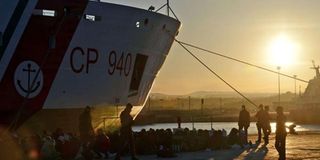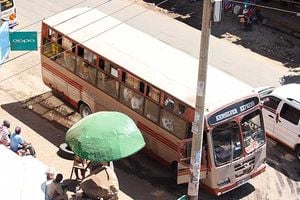These tragedies are an indictment of Africa’s enduring failed leadership

Shipwrecked migrants sit on the quayside after disembarking from a rescue vessel in the Italian port of Augusta in Sicily on April 16, 2015. PHOTO | GIOVANNI ISOLINO |
What you need to know:
- My dear Kenyans, let us disabuse ourselves of the notion that we are immune to the African condition.
- Unless we solve our own burning issues, we remain forever at risk of another implosion.
Big African news stories in the past few days have obviously been the murderous attacks in South Africa targeting Africans from other countries and the Mediterranean boat disasters that continue to claim a horrendous toll on Africans fleeing their homes in search of greener European pastures.
TIA. This is Africa. Whatever effort we make towards telling the good, upbeat, positive stories from the continent, we are rudely interrupted by death and destruction that simply cannot be ignored.
Every African forum these days — whether that be the annual African Union Heads of State gabfest or the African Editors’ Forum biennial — will be strong on the imperative for African media to focus on the African narrative.
We will be reminded how important it is to abandon the stereotypical tales of death, destruction, conflict, poverty, and disease and switch to a new narrative of hope and optimism.
Then South Africa happens. Or the Mediterranean boats. Or Ebola, or Garissa, or Congo, or Somalia, or Boko Haram, or any of the other shameful things that blight this continent.
We have our own problems with Al-Shabaab terrorists and no amount of trying to sweep bad news under the carpet will stop the crazy jihadists, restore peace and normalcy, and give tourists the confidence to come back.
While we ponder our own challenges with mad bombers, we can spare a few minutes to think about the aforementioned tragedies still unfolding on opposite poles of the continent.
They are happening far away. Durban and Johannesburg, for many Kenyans, are way down south and there might be little connection.
There is no news so far that Kenyans in South Africa have been affected and, in any case, the numbers settled, studying, or working in the land of Madiba might be a largely small middle and upper class lot that is not competing with the local people for space, jobs, and women in the teeming townships.
As for the Mediterranean and those rickety boats taking African runaways from Libya to Italy, that is a world away and surely of little concern.
Think again. All those Zimbabweans, Mozambicans, Zambians, and other African migrants in South Africa fled their own countries because of political turmoil, or simply the search for economic opportunities.
All those escapees from large swathes across West Africa and downwards to our neighbours in Somalia, Eritrea, and Sudan are taking those suicidal boat rides from Libya to Europe for similar reasons.
BAD LEADERSHIP
All those who flee their countries for safety, security, and jobs elsewhere are actually fleeing oppression, disease, hunger, poverty, and conflict. They are fleeing what we are often told not to write about. They are escaping bad leadership.
My dear Kenyans, let us disabuse ourselves of the notion that we are immune to the African condition. We can no longer proudly proclaim that Kenya is an island of peace and prosperity in a sea of turmoil. We witnessed first-hand how speedily we can descend into atavistic butchery and bloodletting in the wake of the disputed 2007 elections.
Instead of learning from the violence that almost tipped this country over the precipice, we preferred to go for temporary fixes in the way of temporary power-sharing deals between individuals. Selfish “let us eat together” pacts do not even pretend to address the very serious social, economic, political, ethnic, and sectional fissures that make Kenya a ticking time bomb.
Unless we solve our own burning issues, we remain forever at risk of another implosion. The end result will be that it will be us running away to seek refuge in Jozi or trekking and trucking across Africa at the mercy of human traffickers in desperate attempts to get to Libya and board those killer boats to nirvana or death.
We can resolve as Kenyans to fix the things that need fixing. If bad, greedy, selfish, and exploitative leadership is what allows Al-Shabaab, unequal development, and ethnic tensions to thrive, then it is within our power to solve that particular problem. We will do that when we grow out of our narrow ethnic cocoons and elect leaders based on their programmes, policies, ideologies, and competence.
Until we break away from the grip of ethnic chieftains, we must keep the suitcases packed for that adventure to the shores of the Mediterranean.





